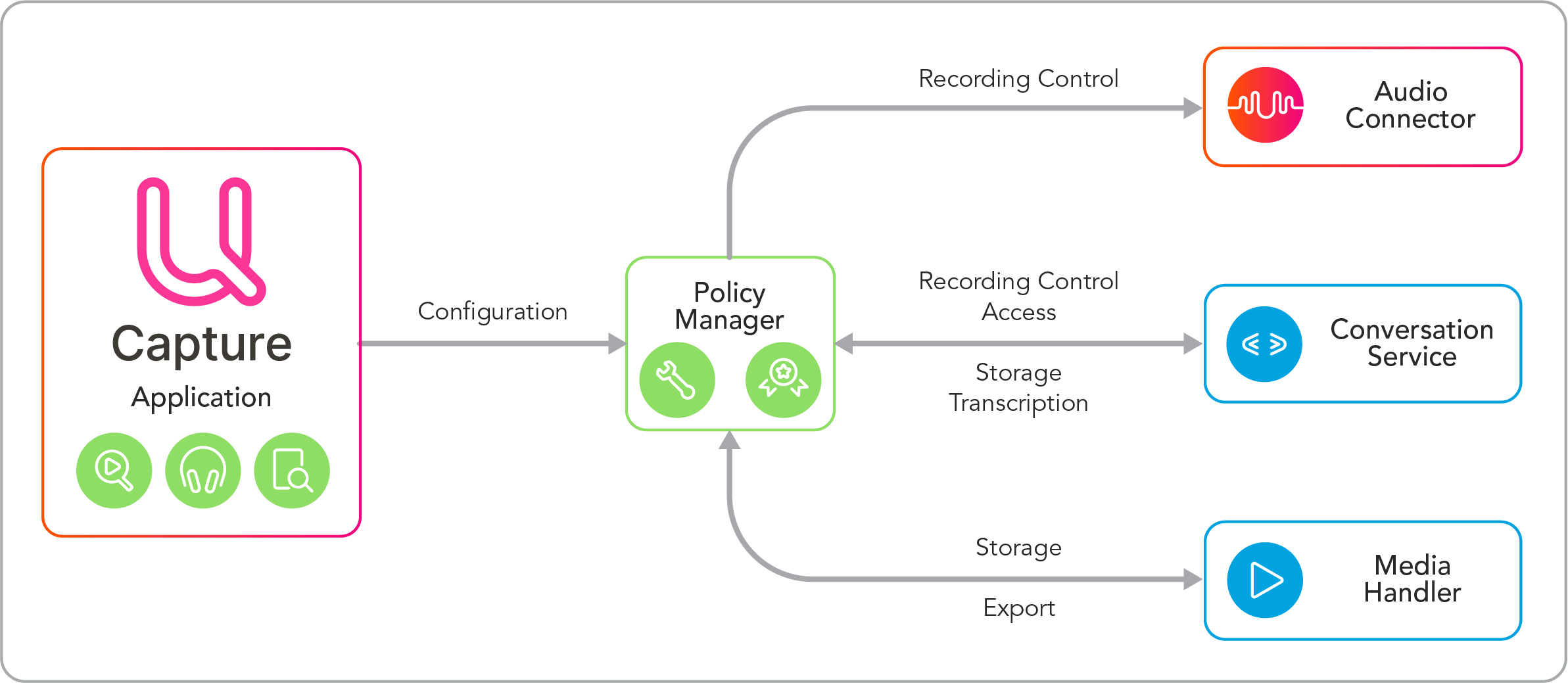Policy Manager
As the name suggests the Policy Manager manages the system policies, these policies are designed to help with regulatory, data retention, and management requirements. the U-Capture policies include Recording Control, Storage, Transcription, Export, Access, and locks policies, you can use policies to manage which calls are recorded, where call data is stored, which calls are automatically exported and where they are exported to, which users and user groups can access which calls, and what calls are locked (blocked from deletion). For detailed information on each type of policy and how to manage them, see Manage U-Capture Policies.
The system components that make up U-Capture use policies to determine aspects of their function, the following describes how each component works with the Policy Manager to deliver the various features that U-Capture provides:
Audio Connector – works with the Policy Manager to determine if a call should be recorded.
The Audio Connector will receive a list of policies that match the calls metadata and check if a Blocklist policy is applicable, if the call matches a Blocklist policy then the call will not be recorded. The Conversation Service will also check with the Policy Manager and if a call is not to be recorded it will label the Conversation as not recorded due to a Blocklist policy.
Conversation Service – works with the Policy Manager to label calls as recorded/not recorded (Blocklist policies, as mentioned above), provide filtered search results for users (Access Policies), delete or move call metadata (Purge/Archive policies), provide call transcriptions (Transcription Policies), and tag calls to indicate which policies have been applied to the call (Allowlist, Purge, Move, Archive, transcription post call, Export policies).
Using Blocklist policies the Conversation Service determines if it should provide the Audio Connector with a Conversation ID for a incoming call or if it should label the call as not recorded.
Using Access Policies the Conversation Service provides a filtered set of search results matching a users access privileges, when a user searches for a call in the UI they can search across the metadata stored in the Conversation Service, the Conversation Service checks with the Policy Manager to confirm which calls the user is allowed to access (access privileges are determined using a combination of User Management Hierarchy/Roles and Access Control Policies), and then provides filtered results to the user that match the users initial search within their access privileges.
As the Conversation Service handles call metadata, when calls match an archive policy the conversation service provides the call metadata to the policy manager where it will be sent to archive storage, the call in Conversation Service will have it's metadata removed (excluding call ID, start and end date). Similarly when a call matches a purge policy the call metadata is removed from calls that match the filter in the policy (again excluding the call ID, start and end date).
When a call matches a post call transcription policy the Conversation Service provides the transcription (transcribed by the ASR) to the Policy Manager where it is then sent to the transcription server.
When the calls are processed for Allowlist, Storage, Transcription, or Export policies the Conversation Service tags the conversation with the relevant policy tag.
Media Handler – the Media Handler works with the Policy Manager to action Storage and Realtime Export policies.
For Storage policies, when a call matches a Purge Media, Purge Media/Metadata, or Archive Media policy, the Media Handler and Policy Manager will process the related calls according to the policy and then the Media Handler will remove the audio from the relevant Storage Location.
For Realtime Export policies, when an incoming call matches a Realtime Export policy the Media Handler will provide the realtime media stream to the endpoint specified in the policy.

Note
The above summarizes how the policy manager is used to configure various parts of your U-Capture system, the Policy manager has additional features that are used by other applications, see the relevant documentation for details.